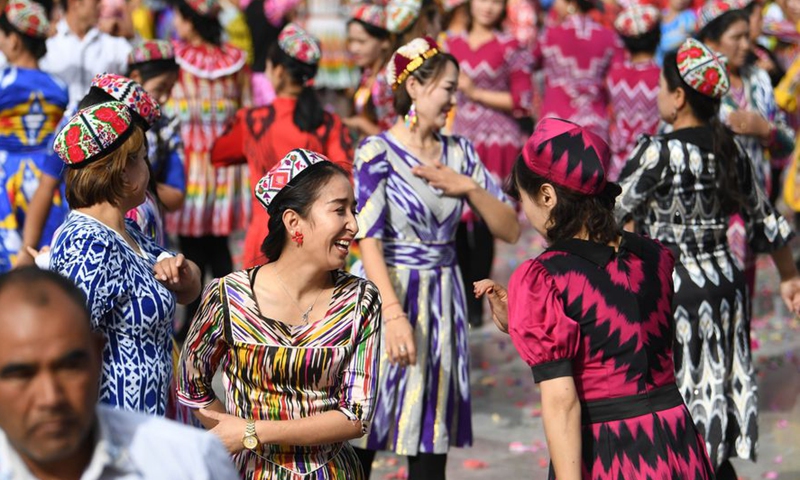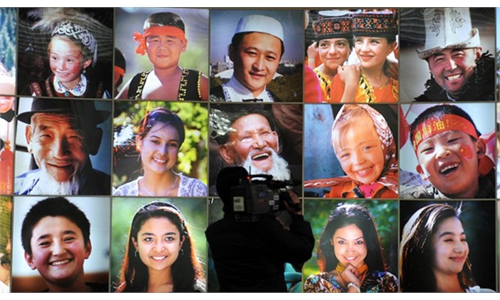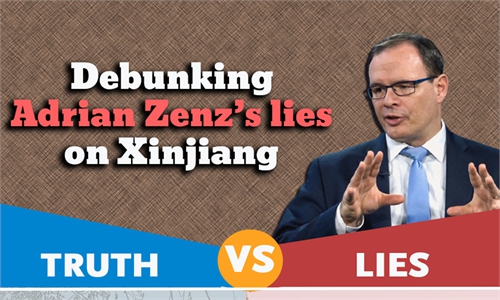US pressure, value bias behind EU sanctions over Xinjiang
Civil lawsuits, unreliable entity lists possible countermeasures: experts

People dance at a square during a culture and tourism festival themed on Dolan and Qiuci culture in Awat County of Aksu Prefecture, northwest China's Xinjiang Uygur Autonomous region, Oct. 25, 2019.Photo:Xinhua
Sanctions imposed on China on Wednesday by the EU in the name of "human rights concerns" are a new example of how the bloc was pressured by the US and some internal anti-China groups to use misinformation on Xinjiang as a weapon to target China, with Chinese diplomats and observers urging the EU to stop hedging its bets as China will not back off on its core interests.
The EU on Wednesday greenlighted sanctions for alleged human rights abuses in Xinjiang on four Chinese officials and one entity, and the methods include travel bans and asset freezes, according to Reuters.
The names will be made public after formal approval by EU foreign ministers next Monday.
Chinese Ambassador to the EU Zhang Ming warned on Tuesday that sanctions based on lies could be interpreted as deliberately undermining China's security and development interests.
"We ask the EU side to think twice. If some insist on confrontation, we will not back down, as we have no option but to fulfill our responsibilities to the people of our country," Zhang said.
There has been growing hostility against China within the EU on human rights issues, as it is facing great pressure from the US to join its anti-China alliance. The bloc is quite divided, with some active internal anti-China groups and lobbyists, analysts said.
Cui Hongjian, director of the Department of European Studies at the China Institute of International Studies, told the Global Times that public opinion has been misled by some anti-China forces with fake news and reports. Conservative forces all pressured the governments to take a tougher stance, although China and the EU have many shared interests in economic issues and trade.
He Zhipeng, dean of the Law School and executive director of the Human Rights Center at Jilin University, pointed out that such human rights excuses form the glue between the EU and the Biden administration, which use "values" to form an anti-China front.
The EU should be aware that reckless collisions with China will lead to huge and unpredictable risks to China-EU ties, experts said, calling on the bloc to weigh the pros and cons before getting onto the US' chariot.
Value-centered coercion against China reflects Western ideological bias deeply rooted in their societies against a country with a different system, as well as their hegemonic mindsets using the explanation of human rights, He said.
China has repeatedly rejected lies and misinformation about Xinjiang while its anti-terrorism and de-radicalization efforts, as well as policies supporting employment and economic growth, were frequently smeared by the West as violations of human rights.
Observers emphasized that there are conscientious voices in Europe and the EU, and these should not be hijacked by some internal anti-China hardliners - in many cases conservative politicians - who use topics like Xinjiang and Hong Kong to make publicity stunts.
On March 7, Chinese State Councilor and Foreign Minister Wang Yi mentioned French author Maxime Vivas, who used what he saw in Xinjiang to debunk lies about the region spread by people who had never been there.
Chinese individuals and entities could sue foreign entities that jeopardized their interests and damaged their interests, as some cotton and textile firms in Xinjiang did in response to rumormonger Adrian Zenz, He Zhipeng said.
China's top legislature, during this year's two sessions, vowed to make a legislative push to deter unjustified external sanctions and interference, expanding the legal toolkit as more vigorous protection measures.
Similar to the unreliable entity list mechanism issued by the Chinese Ministry of Commerce last year, China is open to enacting similar lists as countermeasures against unjustified foreign sanctions, He noted.



